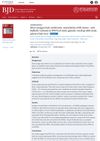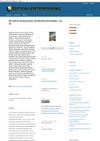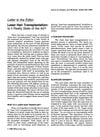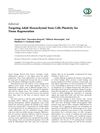 1265 citations,
October 2013 in “The Journal of Clinical Endocrinology and Metabolism”
1265 citations,
October 2013 in “The Journal of Clinical Endocrinology and Metabolism” The guideline suggests using specific criteria to diagnose PCOS, recommends various treatments for its symptoms, and advises screening for related health issues.
[object Object] August 2022 in “Regenerative Medicine” Adipose-derived stem cells show promise for cosmetic treatments but need more research.
 1 citations,
January 2017 in “Social Science Research Network”
1 citations,
January 2017 in “Social Science Research Network” The document suggests creating a secure database for indigenous knowledge and recommends that the TKDL actively fight patents that slightly alter traditional knowledge.
 62 citations,
April 2013 in “Steroids”
62 citations,
April 2013 in “Steroids” PCOS symptoms change with age; younger women have higher androgen levels and less metabolic issues, while older women face more metabolic challenges despite milder PCOS symptoms.
 124 citations,
June 2002 in “Best Practice & Research Clinical Endocrinology & Metabolism”
124 citations,
June 2002 in “Best Practice & Research Clinical Endocrinology & Metabolism” Polycystic Ovary Syndrome likely starts in childhood and may be genetic and influenced by early hormone exposure.
 36 citations,
November 2018 in “American Journal of Clinical Dermatology”
36 citations,
November 2018 in “American Journal of Clinical Dermatology” Alopecia is linked to various health and mental conditions, impacts life quality, and needs medical attention beyond its cosmetic effects.
 16 citations,
February 2018 in “European Journal of Endocrinology”
16 citations,
February 2018 in “European Journal of Endocrinology” Diagnosing hyperandrogenism in women is complex and requires accurate testing methods and consideration of SHBG levels.
[object Object]  5 citations,
May 2017 in “Current Opinion in Pediatrics”
5 citations,
May 2017 in “Current Opinion in Pediatrics” Hormonal therapies are safe and effective for treating acne in female adolescents, with specific treatments for those with endocrine disorders.

The document listed various medical job opportunities with competitive benefits and living conditions.
January 2024 in “Medicina” Statins may help treat PCOS by lowering androgen levels and improving cholesterol.
 40 citations,
March 2016 in “The Journal of Clinical Endocrinology & Metabolism”
40 citations,
March 2016 in “The Journal of Clinical Endocrinology & Metabolism” Young girls whose mothers have PCOS may have higher activity of a specific enzyme that could lead to developing PCOS later.
 81 citations,
July 2008 in “The Journal of Clinical Endocrinology and Metabolism”
81 citations,
July 2008 in “The Journal of Clinical Endocrinology and Metabolism” Certain mutations in the H6PD gene cause Cortisone Reductase Deficiency by affecting hormone production.
 42 citations,
April 2011 in “Annals of Pharmacotherapy”
42 citations,
April 2011 in “Annals of Pharmacotherapy” Flutamide effectively treats female pattern hair loss with low doses showing good liver tolerance.
 February 2020 in “Our Dermatology Online”
February 2020 in “Our Dermatology Online” A synthetic drug and a South American herb may help treat alopecia areata in Chinese men.
 September 2023 in “British Journal of Dermatology”
September 2023 in “British Journal of Dermatology” Some cases of short anagen hair syndrome are linked to specific genetic variations that are also connected to male pattern baldness.
 2 citations,
July 2023 in “Journal of Cosmetic Dermatology”
2 citations,
July 2023 in “Journal of Cosmetic Dermatology” The topical treatment reduced hair loss and improved hair growth in patients with certain types of hair loss.
January 2024 in “Italian Journal of Dermatology and Venereology”  4 citations,
January 2017 in “Ciência Rural”
4 citations,
January 2017 in “Ciência Rural” A horse in Brazil with skin and gut issues was diagnosed with a severe disease and had to be euthanized.
September 2023 in “Editora Pascal LTDA eBooks” The book covers new health research in beauty, dentistry, nursing, biology, and medicine.
 January 2023 in “Editora Enterprising eBooks”
January 2023 in “Editora Enterprising eBooks” The document's conclusion cannot be provided because the document is not accessible or understandable.
 12 citations,
November 2021 in “Journal of Clinical Medicine”
12 citations,
November 2021 in “Journal of Clinical Medicine” Kidney transplant patients who had COVID-19 experienced a significant drop in their quality of life due to long-lasting symptoms.
2 citations,
February 2021 in “Case reports in dermatological medicine” The new topical botanical formulation significantly regrew hair in all five patients without side effects.
 July 2022 in “Research, Society and Development”
July 2022 in “Research, Society and Development” The conclusion is that different treatments improved hair growth in dogs with Alopecia X, but results varied and not all dogs had complete hair regrowth.
3 citations,
June 2020 in “Journal of Dermatological Treatment” Triamcinolone acetonide is slightly more effective than betamethasone for hair regrowth in localized alopecia areata.
 12 citations,
January 1978 in “The Laryngoscope”
12 citations,
January 1978 in “The Laryngoscope” Using a scalp flap for hair transplantation gives denser, faster results than older methods, but it's complex and needs careful planning.
 15 citations,
January 1996 in “Lasers in Surgery and Medicine”
15 citations,
January 1996 in “Lasers in Surgery and Medicine” Lasers in hair transplantation may have potential but require caution due to possible damage and reduced graft survival.
 11 citations,
February 2019 in “Research and reports in forensic medical science”
11 citations,
February 2019 in “Research and reports in forensic medical science” DNA phenotyping helps predict physical traits from DNA with varying accuracy and requires careful ethical and legal handling.
 3 citations,
January 2017 in “Stem Cells International”
3 citations,
January 2017 in “Stem Cells International” Adult mesenchymal stem cells can help regenerate tissues and are promising for healing bones, wounds, and hair follicles.
 December 2024 in “Research Journal of Pharmacy and Technology”
December 2024 in “Research Journal of Pharmacy and Technology” Seablite root extract may help prevent hair loss and promote hair growth.
 4 citations,
April 2020 in “Facial Plastic Surgery Clinics of North America”
4 citations,
April 2020 in “Facial Plastic Surgery Clinics of North America” Hair loss in women is complex to diagnose and treat, and hair restoration should be done by experts. Using minoxidil before surgery can help manage post-surgery hair shock loss. The Follicular Unit Transplantation method is recommended for women due to its speed, no need for shaving, and better graft quality. Strategies like L, T, and reverse L patterns can help restore central hair density, and regenerative methods can improve graft survival in hair transplants.























